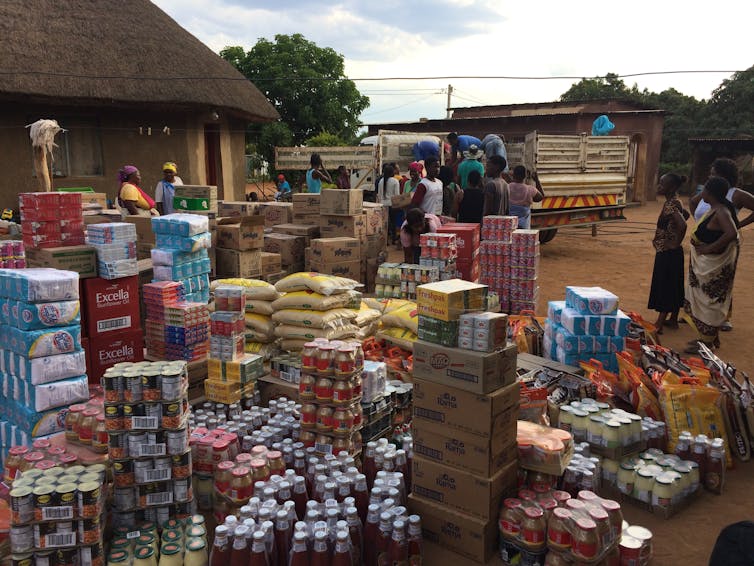Mutual aid in a global food crisis
[ad_1]
Stark warnings of a looming world-wide food disaster spark worry as millions of people today will possible descend into hunger in the coming months.
As the New York Periods set it, for the international meals source “there are couple worse international locations to be in conflict than Russia and Ukraine.” Almost 50 nations, lots of small-income and several in Africa, rely on these two countries for much of their wheat, as properly as other grains and cooking oils.
For households chronically at hazard of meals insecurity, the Russian invasion is the hottest in a lengthy collection of pressures.
The proportion of the world population at moderate or extreme threat of starvation has been mounting since 2015 as a result of the blended impacts of the local climate crisis, conflict and more a short while ago COVID-19.
The gals I do study with in N’wamitwa, South Africa, have been staring down foodstuff crises and doing the job to mitigate the consequences for a long time. Many of these females are counted among “the poorest of the inadequate.” This usually means they reside on much less than US$1.90 a day (the Planet Bank’s funds metric for intense poverty) and tumble below their country’s least expensive poverty line, inadequate revenue to meet up with least foodstuff needs.
Irrespective of being “poorest of the weak,” these ladies are not sitting on their fingers waiting around for support. Like resource-very poor folks all around the world, they are hectic devising approaches and enacting strategies to satisfy the latest challenge of food items shortages and surging rates.
Preserving households afloat
Thirty yrs ago, these gals recognized a co-operative farm in the midst of a catastrophic regional drought — we designed a film together about the ongoing value of Hleketani Group Backyard garden to their households.
Irrigated by water-conserving drip hoses, the backyard garden provides nutritious, reasonably priced create year spherical. It was a lifeline for the village in the course of South Africa’s rigorous pandemic lockdowns.
The pandemic “destroyed things at my home, my neighborhood, and my nation. We could not check out our neighbours, could not verify on our relations,” suggests founding farmer Josephine Mathebula. “The farm fed us.”
Yet another important approach these women of all ages go after is financial savings golf equipment, regarded in South Africa as stokvels. As Caroline Shenaz Hossein, a global enhancement and political science researcher, argues, these cost savings golf equipment are “at the extremely core of what we know as the solidarity social overall economy.”
They are a essential illustration of the various, ethical economic tactics — which include co-operatives and other types of mutual aid — that assist keep weak homes and communities afloat.
South African stokvels are community created, self-operate financial savings clubs the place users shell out a month-to-month fastened sum and choose turns amassing the cash gathered. Golf equipment multiplied all through the 1990s and 2000s, bolstered by increasing self confidence among Black and brown South Africans just after acquiring democracy, and in the experience of urgent requirements in the course of the HIV/AIDS pandemic.
Stokvels are considerably more than a piggy financial institution for enforced personal savings. Demanding procedures about contributions, borrowing and desire (specific to every single team) goal to instil fiscal self-discipline and autonomy. Club names like Titirheleni (function for yourself) converse to these kinds of goals.
Ladies in these rural communities say the clubs are rooted in customary tactics of shared labour and reciprocal guidance. Farmer Sara Mookamedi notes that club members “help each individual other, like a family” — albeit one that kicks users out if they fall foul of the policies.
The benefit of discounts clubs
All 27 women of all ages who perform at Hleketani Back garden are customers of cost savings golf equipment. Some belong to as quite a few as 6 or 8 unique teams. Although customers help save for every thing from children’s publish-secondary instruction to h2o tanks to funeral bills, “grocery price savings is the variety 1 priority” according to Basani Ngobeni, a resident of the village and my longtime study collaborator.
Associates of grocery savings clubs sock absent funds all 12 months for bulk buys of dry goods, with some contributing 100 rand (US$6.50) for every thirty day period, other folks substantially far more.
In December, they retain the services of a truck and travel to a wholesale warehouse in the city 40 kilometres absent to fill their significant buy. Clubs prioritize items that are high-priced at retail value or challenging to discover in the village — points like flour, canned fish and sanitary items. The grocery haul a member can take home is in line with their payments all over the year.

(Elizabeth Vibert), Author presented
With the cost of a basic basket of meals for low-profits homes growing 10 per cent in South Africa in excess of the previous 12 months — even in advance of events in Ukraine — several South Africans facial area main difficulties in securing ample, healthy food items for their family members. The discounts clubs are a lifeboat.
Crisis is absolutely nothing new in several communities throughout the World-wide South. These communities have been formed by colonialism, by trade and agricultural policies that undermine nearby flourishing, by conflict and by the impacts of a climate unexpected emergency they did not develop. Crisis is a provided for resource-bad households globally, but — in the absence of supportive procedures — so are these careful strategies of self-provisioning and mutual support.![]()
Elizabeth Vibert, Professor of Colonial Heritage, University of Victoria
This report is republished from The Discussion beneath a Artistic Commons license. Read the first short article.
[ad_2]
Resource hyperlink
